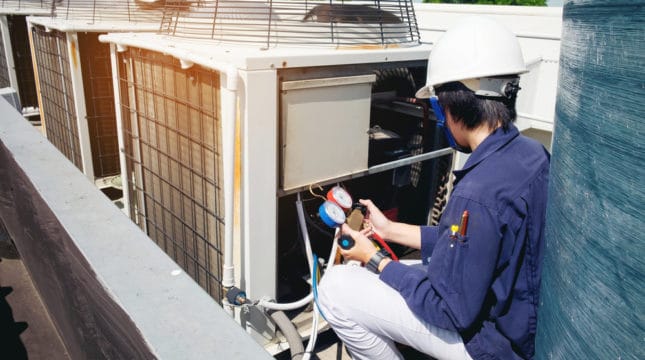Do you need a Maryland HVAC license?
If you plan to offer HVAC services in Maryland, you’ll need a license from day one. The Maryland Board of Heating, Ventilation, Air Conditioning and Refrigeration Contractors (HVACR) offers different HVAC license types, depending on how much responsibility and independence you want:
- Master license
- Limited master license
- Limited license
- Journeyman license
A typical path looks like this: apprentice to journeyman to master. You can also advance to limited contractor or master contractor license if you want to start your own HVAC business.
EPA 608 Certification
To work with refrigerants in HVAC systems, you must earn the EPA 608 certification. This federal requirement ensures the safe handling of ozone-depleting substances. The certification comes in four types: Type I (small appliances), Type II (high-pressure systems), Type III (low-pressure systems), and Universal (all systems).
To get certified, pass an exam covering safe refrigerant practices, environmental regulations and leak detection. Exams are offered by approved testing organizations, with study guides available. There is no renewal requirement, so once certified, it lasts a lifetime.
Insurance requirements for a Maryland HVAC license
Maryland requires master, master restricted, and limited contractors to carry specific HVAC insurance coverage. Think of it as your safety net, protecting both you and your clients.
Workers’ Compensation insurance
Your HVAC employees climb into attics, handle heavy equipment and work with complex systems daily. Maryland workers’ comp is required by state law, but it’s also a smart business move. It helps cover medical costs and lost wages if you or any of your workers get hurt on the job.
Learn more about workers’ compensation for contractors.
General Liability insurance
General liability insurance is non-negotiable for some HVACR contractors. In Maryland, master, master restricted, and limited contractors must carry at least $300,000 in general liability coverage and $100,000 in property damage insurance.
This coverage can help cover your business from common risks, such as property damage to someone else’s property or the medical expenses around injury to non-employees. It can also help protect against personal and advertising injuries.
Learn more about general liability insurance for contractors.
Commercial Property insurance
Whether you’re working from a home office or running a full warehouse, commercial property insurance helps protect your business space and everything in it, from office equipment to stored HVAC units waiting for installation. Whether you rent or own your property, this coverage helps protect against mishaps such as fire or theft.
Business Owner’s Policy
A business owner’s policy, or BOP insurance, provides broad coverage of general liability and commercial property policies combined in a single, more cost-efficient bundle. It helps cover damage that you or your employees may inadvertently cause to another person’s property and helps protect your business inventory in the event of a fire or other covered event.
Tools and Equipment insurance
Your tools are your livelihood. When a $2,000 diagnostic tool walks off a job site or your equipment gets damaged, tools and equipment coverage can help you replace what you need to keep working without breaking the bank.
Commercial Auto insurance
Those service vans aren’t just transportation — they’re mobile workshops carrying thousands in tools and equipment. Commercial auto insurance helps protect your vehicles and whatever you’re hauling to the next job.
Coverage minimums are:
- $30,000 for bodily injury
- $60,000 for two or more people
- $15,000 property damage
Steps to get your HVACR license in Maryland
Let’s start with the good news: you can kick off your HVAC career right away as an apprentice. From there, you can advance to a journeyman and, finally, master HVAC license.
1. Maryland HVAC apprentice license
Getting your Maryland HVAC apprentice license is straightforward. No prerequisites needed — just a willingness to learn.
If you’re not sure where to find apprenticeship opportunities, the Maryland Apprenticeship and Training Program (MATP) can help. They’ll connect you with HVAC companies in the county where you want to work that are looking for apprentices.
You’ll fill out the one-page online apprentice application form and pay a modest $11 application fee. Once approved, you can officially begin working on HVAC jobs and building the experience you’ll need for that next-level journey license.
2. Journeyman HVAC license
Let’s start with moving from apprentice to journeyman. You’ll need four years and 6,000 hours of hands-on training under your belt. Good news: you’ve got options here:
3. Limited license
After getting your journeyman license, you can opt for a limited license if you don’t want to get the full-blown master license. The limited license allows HVAC professionals to maintain
or repair heating, ventilation, air conditioning, refrigeration or hydronic systems, but are not allowed to perform installations or retrofits of HVACR systems.
To get this license you:
- Must be a licensed journeyman and have provided HVACR services under the direction of a licensed HVACR Master for at least two years.
- Worked a minimum of 1,000 hours in the year before applying.
- Pass the limited contractor exam.
4. Master restricted and master license for HVAC in Maryland
After working as a journeyman for at least three years and logging 1,875 hours working under someone with an HVAC master license, you can take the master license exam. Then, you’ll apply for an HVAC master license.
A master license is your ticket to complete independence: installing and maintaining HVAC systems without supervision. It’s the difference between “I’ll check with my supervisor” and “I’ve got this handled.”
If you don’t want to be a jack-of-all-trade, consider a restricted master license. It lets you specialize in specific areas of HVAC work, like air conditioning, forced air, hydronic, refrigeration or ventilation. It still lets you do advanced work, and it’s perfect if you’ve found your niche and want to focus on what you do best.
Of course, there are fees involved. The Maryland Board updated the fees on January 1, 2024:
- Journeyman: $22.50
- Limited: $84
- Master: $84
- Master restricted: $28 for each category, up to a maximum of $84
Taking Maryland HVAC license exams
You’ll take the HVAC licensing exam through a company called PSI. You register for the exam directly from the PSI website.
The fee is due when registering, and the cost varies depending on the test you’re interested in. Journeyman, limited and master license exams will set you back $150. Master restricted license exams are $50 for each specialty, and you can combine up to four areas if you want to diversify your expertise.
For both journeyman and master licenses, you’ll have 100 questions and get a generous four hours to work through them. The passing score is 70%, which means you’ve got room to miss a few while still succeeding.
The limited exam has 50 questions, and you have two hours to complete it. Like the other licenses, you must pass with a 70%.
If you’re going for a master restricted license, the specialty exams are a bit shorter. You’ll get two hours to answer 50 questions. The only exception is the ventilation specialty, which has 40 questions and a 90-minute time limit. Same deal though: schedule through PSI and aim for that 70% passing score.
How quickly can you complete Maryland HVAC license requirements?
The actual licensing process moves fairly quickly once you’ve completed your training and work requirements. When you’re ready for your exam, PSI takes up to a week to process your documentation and work experience. Keep an eye on your inbox for their scheduling email once you’re cleared to test.
After passing the Maryland HVAC exam, you’ll send your license application to the Board. They’ll review it, which typically takes 10 business days.
MD HVAC license reciprocity
Before working across state lines, you must have a Maryland HVAC license. Maryland accepts HVAC licenses from Delaware and Virginia through reciprocal agreements. Just submit your application for reciprocal license (there is no application fee).
Renewing your HVAC license in Maryland
Maryland HVAC licenses expire on October 1 in odd-numbered years. Renewal is pretty straightforward — you’ll submit your HVAC renewal application and pay. No continuing education units are needed for renewal.
All master, master restricted and limited contractors must also submit proof of general liability and property damage insurance.





